‘Peanut Butter Falcon’ celebrates getting the most out of life
“The Peanut Butter Falcon” (2019). Cast: Shia LaBeouf, Dakota Johnson, Zack Gottsagen, John Hawkes, Bruce Dern, Thomas Haden Church, Jon Bernthal, Yelawolf, Jake “The Snake” Roberts, Mick Foley, Wayne DeHart, Bruce Henderson. Directors: Tyler Nilson and Mike Schwartz. Screenplay: Tyler Nilson and Mike Schwartz. Web site. Trailer.
How many of us are living truly fulfilled lives? Do we approach our existence with all-out gusto and a willingness to pursue our dreams? Or are we restricted by rules, regulations, fears and regrets – many of our own making – that keep us from fulfilling our potential? Sometimes it takes breaking out of rigid, ingrained patterns of thought and behavior that prevent us from getting the most out of our time in this reality. Such are the themes that underlie the story line of the charming new comedy-drama-road trip movie, “The Peanut Butter Falcon.”
Have you ever been in a situation where there was something you wanted to do but were prevented from doing so by those who thought you were incapable? That’s the problem faced by Zak (Zack Gottsagen), a 22-year-old affected by Down syndrome. Having been abandoned by his family, Zak became a ward of the state. But, given the lack of adequate residential facilities for individuals with his condition in his eastern North Carolina community, he’s been forced to live in a senior citizens’ home. And he hates it. As the only resident in his age range and with his condition, he feels isolated. He wants out.
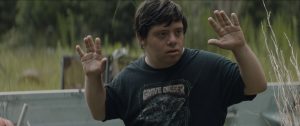
Eager to pursue his dream of becoming a professional wrestler, Zak (Zack Gottsagen) escapes from his residential care facility to attend a school run by his idol, the Salt Water Redneck, to learn how to become a grappler, as seen in “The Peanut Butter Falcon.” Photo by Nigel Bluck, courtesy of Roadside Attractions and Armory Films.
Zak has a plan, too. As a huge fan of professional wrestling, he dreams of escaping to enroll in a school run by his idol, Salt Water Redneck (Thomas Haden Church), to learn how to become a grappler. His enthusiasm for the sport is obvious, and physically he’s certainly strong enough for it. All he needs to do is figure out a way to get out.
After a failed escape attempt, Zak is labeled a flight risk by his case worker, Eleanor (Dakota Johnson). She realizes he’s unhappy, and she’s doing everything she believes she can to make his life as satisfying as possible. Even with that, though, she has bars placed on his windows to prevent a repeat episode. However, given Zak’s desire to pursue his dream, he vows to escape, and, with the assistance of his elderly roommate, Carl (Bruce Dern), the would-be wrestler finds a way to get out, fleeing in the middle of the night. When Eleanor learns of his getaway, she goes in pursuit of the escapee, but finding the clever fugitive proves to be easier said than done.
After hours on the run, Zak comes upon a fishing boat harbor. Tired and in need of sleep, he takes refuge under a tarp on one of the boats. But that rest is soon interrupted when trouble arises for the boat’s skipper, Tyler (Shia LaBeouf), a rogue crab fisherman who’s been poaching catches from waters claimed by a licensed but vindictive peer, Duncan (John Hawkes). After setting fire to Duncan’s gear in response to strong-arm threats, Tyler looks to make a hasty getaway from the harbor to avoid the retribution of Duncan and his chief muscle, Ratboy (Yelawolf). He jumps into his boat to take off, unaware that he has an unwitting passenger onboard.
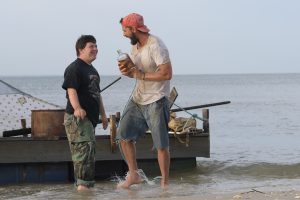
Unlikely road trip companions, wrestling wannabe Zak (Zak Gottsagen, left) and rogue fisherman Tyler (Shia LaBeouf, right) set off on an adventure with others in hot pursuit in the charming new comedy-drama, “The Peanut Butter Falcon.” Photo by Seth Johnson, courtesy of Roadside Attractions and Armory Films.
A high-speed boat chase ensues, but Tyler manages to escape detection by successfully hiding in a patch of tall aquatic reeds. It’s only then that he discovers Zak. Tyler’s not entirely sure what to do, but, realizing that Zak needs help, he quickly, albeit somewhat reluctantly, finds himself developing a sense of responsibility for his young companion.
Responsibility is something that Tyler has never taken to readily. For example, his recent poaching activity illustrates his limitations in this area. But, more than that, he deeply regrets how his lack of this attribute contributed to the death of someone near and dear to him. Helping Zak find his way to wrestling school, then, just might help him to make up for some of these past oversights.
And so, with their destination of the Salt Water Redneck School of Wrestling in mind, the unlikely duo sets off on a quirky, eventful road trip. Along the way, Tyler and Zak have a number of memorable experiences, such as nearly being overrun by an enormous shrimp boat, encountering a blind, aging evangelist (Wayne DeHart) hell-bent on baptizing them, and sailing aboard a makeshift raft. Tyler also provides Zak with some impromptu training as a wrestler, both physically and attitudinally, including the adoption of his ring name: the Peanut Butter Falcon.
The road trip is not without its challenges, though. Both Tyler and Zak are hotly pursued by others (i.e., Duncan, Ratboy and Eleanor), and they clearly don’t have much patience for the vagabonds’ antics. But, through it all, the duo considers their journey an adventure, one that’s akin to a modern-day version of Mark Twain’s Huckleberry Finn. The question is, though, will they reach their destination? And, if so, will it live up to their expectations? For those driven by their dreams, there’s no telling what’s possible.
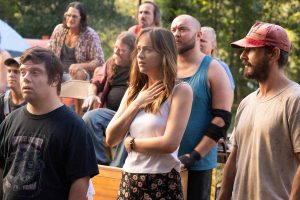
Runaway Zak (Zack Gottsagen, left), case worker Eleanor (Dakota Johnson, center) and renegade crab fisherman Tyler (Shia LaBeouf, right) find life on the road together thrilling but challenging in “The Peanut Butter Falcon.” Photo by Seth Johnson, courtesy of Roadside Attractions and Armory Films.
Those dreams, of course, are largely made possible by our beliefs – beliefs in what we would like to achieve but, more importantly, in what we consider attainable. The trick, though, is figuring out how to formulate the beliefs required to bring those ideas into being. Those are the cornerstone principles underlying the conscious creation process, the philosophy that maintains we draw upon the power of those metaphysical building blocks in manifesting the reality we experience.
A key starting point in this process is developing beliefs where we’re able to envision the desired outcome. As metaphysical author and teacher Gregg Braden has often observed, an effective way of accomplishing this is by picturing the end result as if it’s already happened. In that way, the notion takes on greater weight, an undeniable “density” that helps to root it in our minds and in the line of possible existence we would like to pursue. And that places us one step closer to the outcome’s realization.
In this story, Zak is so sold on becoming a professional wrestler that coming up with beliefs and plans to see it happen are almost second nature, and that makes its materialization that much more likely. He thus serves as a powerful influence to those around him, most notably those in need of getting their acts together and their lives on track. Tyler most readily comes to mind here, given that he appears to have been aimlessly drifting for some time. But, in her own way, this also applies to Eleanor, someone who appears to have more gifts to offer others than merely serving as a mid-level administrator in a nursing home. While there may be nothing inherently wrong with that, it seems that it’s below her capabilities and potential. Perhaps Zak can inspire both of them to find their callings by helping instill in them the ability to envision their future in the same affirmed way he does.

Angry fisherman Duncan (John Hawkes) seeks retribution against a poacher of his catches in the quirky new comedy-drama, “The Peanut Butter Falcon.” Photo by Nigel Bluck, courtesy of Roadside Attractions and Armory Films.
Zak is able to accomplish this in large part by not letting limitations hold him back. He doesn’t see his condition as a disability; it’s merely who he is, something he has to work with, but it’s by no means something that intrinsically deters him from following his dreams. In that regard, he’s not only an inspiration to his fellow travelers, but also to anyone who all too easily allows personal crutches from getting in the way of living our lives. And that’s important to recognize, since such notions are beliefs (and self-fulfilling ones at that), not unlike the intents we employ when we seek to manifest anything that’s part of our existence.
In essence, such an attitude reflects the concept of living heroically, moving past our fears and apprehensions to see our aspirations come into being. Again, Zak is an inspiration in this regard, refusing to allow those elements to get in his way, be it an approaching shrimp boat, a vindictive crabber pursuing him and his travelling companion, or a social welfare system seeking to hem him in and keep him from what he wants out of life. That’s powerful stuff, again, not only for those close to him, but also to anyone who’s approaching life timidly and needs to break out of that pattern.
A key component of such an outlook is to learn the power of redemption. The guilt we often experience in the wake of tragedies and disappointments can linger, in large part because it, too, is a belief, one that can become all too easily entrenched. Consequently, we may become stuck in our own thoughts, unable to move forward. But, as conscious creation maintains, we have an infinite range of possibilities for existence available to us at any given time, meaning that our realities can indeed be changed. And those changes, like anything else we create, depend on the beliefs we maintain, including those that allow us to atone for our past, to redeem ourselves for the future that lies ahead of us.
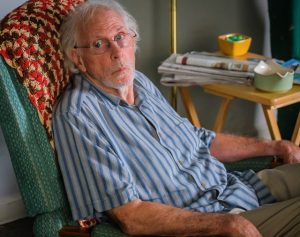
Wily senior citizens’ home resident Carl (Bruce Dern) helps his roommate escape to pursue his dream in “The Peanut Butter Falcon.” Photo by Joe Mast, courtesy of Roadside Attractions and Armory Films.
Many of us may find this difficult, but it’s far from impossible to overcome. This is where the power of forgiveness comes into play. In particular, this involves the forgiveness we show ourselves in the wake of situations that prompted the aforementioned guilt. By envisioning, forming and embracing beliefs that make this possible, we can move into a state of forgiveness, one where we let ourselves off the hook for what may have happened, thereby removing the emotional baggage that makes it easier for us to begin the process of getting on with our lives.
Redemption is something Tyler obviously needs to pursue; his guilt and his failure to forgive himself have kept him stuck in a huge rut for a long time. But, in her own way, Eleanor needs to do the same; while she wasn’t personally responsible for a tragedy of her own, she’s apparently been touched by it in a way that has kept her from fully pursuing the happiness she deserves, a redemptive change she’d be wise to give herself permission to experience.
To achieve this, Tyler and Eleanor should yet again look to Zak for guidance. He was no doubt upset that he was abandoned by his family. And he truly dislikes being called “retard” by disparaging strangers. But he refuses to allow such things to characterize him; he’s not his condition, nor is he defined by everything that has come along with it. These are circumstances he deals with in the process of redeeming himself to become the person he wants to be, a lesson we’d all be wise to follow if we hope to get the most out of life. Zak certainly does.
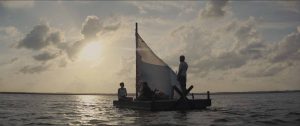
Like characters out of a modern-day Huckleberry Finn, mismatched traveling companions Eleanor (Dakota Johnson, left), Zak (Zack Gottsagen, center) and Tyler (Shia LaBeouf, right) set off on a grand adventure in “The Peanut Butter Falcon.” Photo by Nigel Bluck, courtesy of Roadside Attractions and Armory Films.
Despite some occasionally sluggish pacing and a narrative that’s more than a little predictable, “The Peanut Butter Falcon” is one of the sweetest, most heartfelt feel good comedy-drama-road trip offerings to come along in years. LaBeouf and Johnson turn in some of their best work here, but newcomer Gottsagen is the real stand-out, a natural on screen who charms and surprises at seemingly every turn. This may not be epic cinema, but it’s certainly satisfying, well-crafted, crowd-pleasing entertainment, the kind of endearing story we could certainly use more of these days.
If we’re unsatisfied by the world around us, we should seek to alter it. As Mohatma Gandhi famously observed, “You must be the change you wish to see in the world.” That’s good advice, and we should draw from inspirations that embody it, no matter what source they come from. Zak provides us with a good example to follow, both in the wrestling ring and on the playing field of life.
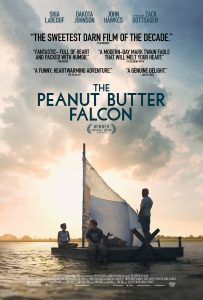
Copyright © 2019, by Brent Marchant. All rights reserved.




Leave A Comment